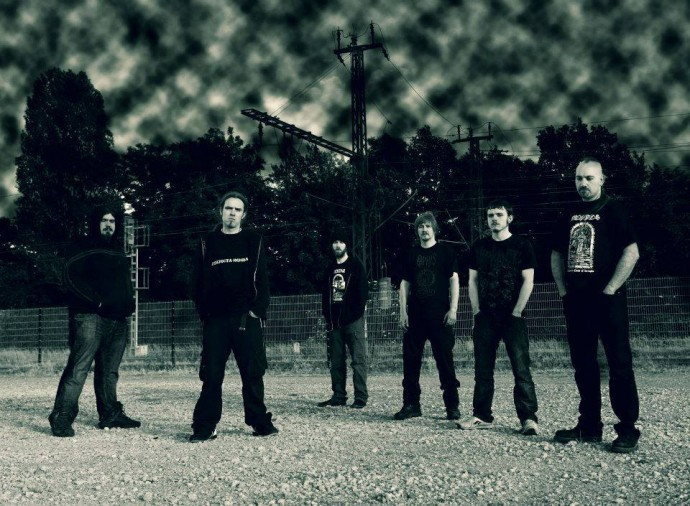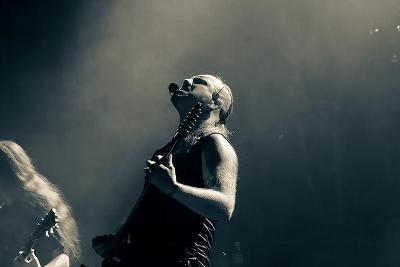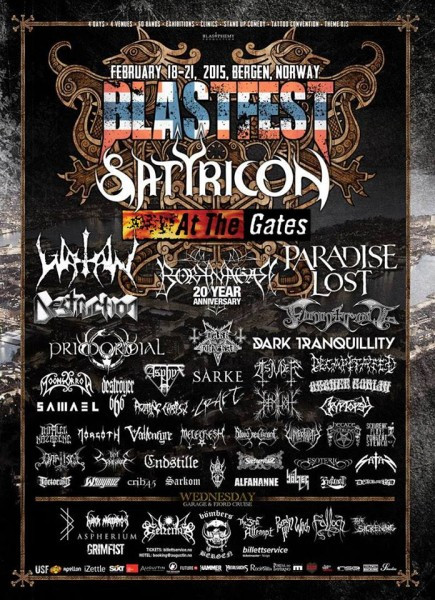There are some bands for whom you need no long introduction. British extreme death/doom metal band Esoteric is one of those. In this interview, which was kindly offered to us by Evita Hofmane and Haralds Strapans of the Latvian P3lican e-zine, Esoteric’s guitarist and vocalist Greg Chandler speaks about life and music being two inseparable things.
In the beginning there was Word, and the Word was Esoteric. Your band has existed for more than 20 years now. Maybe let’s start with a short overview – what is Esoteric?
Esoteric formed in July 1992. We released our first demo in the summer of 1993, which led to a recording deal with Aesthetic Death records. Our first album was released in autumn 1994 and the band has remained active to this day. Now in our 22nd year, we have released 6 albums (4 of which are double albums). Our music has progressed and evolved over time, but the main essence and direction has remained the same. To create, dark, unique music and soundscapes without any limitations in mind.
How would you define the genesis of the Esoteric sound?
I think the origin of our sound came from our experimentation with psychotropics, and the experiences from them aided our vision for the ideas we had. We didn’t just want to write music, we wanted to create songs which had interesting sound effects and manipulation that enhance the atmospheres within the music. And we wanted to do it in a way that it could be reproduced on stage and in rehearsal. So we got whatever effects we could afford and the means of controlling them in real time and it has been a passion from the beginning that we have built up over the years.
Everything that happens or doesn’t happen has a cause. Tell us what is that constant source of inspiration that feeds your creativity all these years?
Past and present experiences, emotions, states of mind, philosophies, and introspection of the self are some of the important factors to us when creating music. I think that by putting your soul and self into music you create a stronger connection with the material, and the performance comes straight from the heart.
What mood are you in when you are creating music?
The emotions deal mostly with the darker side of the mind, yes. Sadness, despair, anger, chaos.
There is a saying that the best artistic works originate from pain and misery. Is that true for Esoteric as well?
Yes, I think that music is a good vehicle for releasing destructive emotions, as a means of maintaining some kind of equilibrium of the mind. If we were inherently happy souls, with no experience of these emotions then I don’t think we would be able to write the music we do, let alone enjoy the process. Some people prefer to steer clear of music that deals with these emotions because it can be unsettling. But for me, I enjoy it. It does not make me feel depressed, rather it helps to alleviate it.
How do you write your music? It just comes to you at the right moment or you sit down and try to make something epic?
The best time to write music is when I am in a heightened or powerful state of mind or emotion that I feel I need to release, to capture that feeling within the music. Good ideas can also come from simply playing, improvising and sometimes it can come straight from the mind, without having an instrument in front of you.
Does everyone in the band have a chance to express their own ideas? How influential are your ideas in the band?
The band has always been a group effort, where all members can contribute ideas and song writing, create their own parts and sounds. Gordon and I have handled a lot of the song writing, but there has always been contribution and songs from other members on every album. Having several song-writers in the band lends more variety and diversity within the music of the band. It keeps it fresh.
Esoteric “Cipher”
What is the reason for 20+ minute songs that’s quite typical for Esoteric?
I think we have more songs shorter than 20 minutes than we do longer, but I guess the main reason is because our music is mostly slow. So it takes more time. We don’t write music with an idea of time frame in mind. That’s why our shortest song is under 3 minutes and our longest is 26. But most are between the 12 and 16 minute range. We tend to just write music and end a song when it feels right.
Do you always play the same version of a song during your live shows?
We rehearse the songs during/after writing them, and then develop the song further in rehearsal, so it is always shaped as a band. We might change some things or experiment with ideas right up to the time of recording, and some parts may also be improvised during the recording. But once finished, the album recording becomes the definitive version that we then rehearse and play live. Yes, we can play the songs as they are written. We practise every week, so it’s something we do often enough to be able to remember all the details within the songs.
When it comes to the length of your albums, you don’t limit yourselves, either. Unsurprisingly, that has led to the release of four double albums. Have you ever considered that such long records might exhaust your audience?
For us, it doesn’t matter how the listener chooses to listen to the music. It’s not something we consider when we create an album. We just try to write diverse albums and they can be experienced in one sitting for those who really get something from it, and for those who like it, but at an arm’s distance, they can absorb it in smaller doses. 🙂
Usually you have been recording and producing in your Priory Recording studio. Tell us about the recording process of your albums!
The first 3 recordings we did were with the whole band playing at the same time and just overdubbing some solos and effects guitars and the vocals and keyboards. The rest we have recorded separately. There are benefits to both methods. Recording together is good for the feel of the album and it is much quicker, but it also gives you less focus on each instrument. We tend to track separately so we can focus on the final details of the writing, the sound, and the performance. It is also because with 6 people in the band, it’s not so easy for everyone to get the same time booked off work for a period of 2 weeks or more to be in the studio together. We need that time for gigs.
What does it take to make your vocals sound the way they do?
I have always been interested in effects and sound in general since I started learning to play guitar. Likewise with vocals, I like to add textures, different ambiences to colour the emotion. I use an Alesis Quadraverb 2 for my vocal effects. Not always in the studio, I also use Eventide, Lexicon, and TC Electronic units, but I have had the Alesis since 1995 and it’s been my live and studio unit since our second album. It has a good amount of effects with broad parameters and extremely flexible routing, patching, and modulation controllers. I spend quite some time constructing the effects and putting in controller commands to give me real-time adjustment of the parameters. When playing live and rehearsing I use a midi foot controller to change programs and send midi commands so that I can control the effects with my feet while we play. Same for guitar. I use ambient and psychedelic effects.
As usual you have been recording and producing in your own Priory Recording studio. You seem to be very self-sufficient. Is it because you always know what you are going for or because nobody understands Esoteric better than you?
Mainly it is because we know what we are going for. And secondly because I have the studio, so it makes sense economically to use it, rather than pay someone else to do it who might or might not be able to accurately interpret what we want from the recording or mix.
After recording you also do all the mixing and mastering. Have you ever thought that all your songs might one day sound the same?
Not really, no. We do most of the production work (dynamics and arrangements of the songs) with our music when we are writing, rehearsing and creating sounds. Almost all of what you hear on the albums is what we play in rehearsal once the song is written, experimented with, and developed for recording. Being in the studio is simply the controlled environment in which to capture the music. And we know what we want from the sound, so for us there is little point employing someone else to do something we can do ourselves. I have been working full time in studios for 17 years now and 2 of the other members of the band also have a lot of studio and production experience. And having done 6 albums now, we always write with the mixing process in mind. So I handle the recording, mixing, and mastering of our albums.
Can you say that this is the Esoteric sound you’ve always wanted?
I don’t really think of anything as ultimate. A recording to me is an expression of time, of an era, of the moment. As with all creations and bodies of work, I take the hindsight and what value I can from that and try to create something new. Move on to the next chapter. It is always wise to strive for perfection, but to stop when you hit your constraints in the real world. It’s a question of spending enough time to make something great, but not enough that you end up running in circles or losing subjectivity. So it’s a case of doing the best you can within the time and budget you have. Having my own studio doesn’t mean I can spend lots of time with my own music. It means that I need to work constantly to pay the rent and keep the business alive.
And now about the design of your albums, that’s also an important part of the message you give to your audience. How do you choose the person who will do this?
We worked with Kati Astraeir on the last 2 Esoteric albums. She created all of the artwork, and the design and layout was handled by Mauro Berchi (Canann, Eibon Records). We basically asked Kati to create some artwork that was inspired by listening to the music and reading the lyrics. And she did a great job in creating her own visual interpretation of the music. Yes, we do try and put some detail and attention to the artwork because we think that the artwork should be related to the music in some way. As we are not artists ourselves, we try to work with people who are receptive to the music and can create something that captures the essence of the music.
Quoting yourself, life has a habit of changing. How did the audience perceive your music, let’s say, 20 years ago as opposed to now?
When Esoteric started there were only a handful of extreme doom bands worldwide, so we were largely in an underground music scene dominated by death and black metal and bands trying to one-up each other in terms of speed. So to come out and play something so slow and heavy was quite hard for a lot of people to take in the early nineties and not particularly well received. For us it didn’t matter. We just wanted to play music without constraints. If people liked it, then it’s a bonus, but we just did our own thing.
And now in 2014 the amount of people listening to extreme doom has grown. It is still a very small sub-genre of music and probably the least popular of extreme metal. But it has become more accepted and so you can see such bands at festivals and touring more often and further afield as the years roll by.
How did your European Dissonance 2014 Tour go? Impressions, insights? Some say that the highest and the lowest points are the most important ones, everything else is just in between. Can you name those?
The tour went ok overall. Compared to other tours it was as expected really. It was quite a long route for the length of the tour, but we got to play some countries and cities we’d not been to before, so it was a good schedule overall. The highlights are always the best shows – those we enjoy the most. Where the sound is good on stage and in the venue and the audience are responsive. For me the best shows were in Lithuania and Finland. The lowest point was on the day where we had a problem with the wheel of the van and couldn’t make it to our show in Szczecin, Poland.
This year the main focus of Esoteric is recording your new album. What can we expect?
We are currently taking a break from playing live in order to focus on the writing for the seventh album. I don’t really want to give too much away regarding this, but we will basically do what we always try to do. Create an album that stands as a worthwhile progression for the band, do our own thing, and write music from the heart, without having limitations in mind. I expect that we will not be recording until next year – we want to take our time with the new material. There is no rush for us – the importance is to create something unique.
You also have a second band named Lychgate. Tell us what’s going on with this project at the moment?
Regarding Lychgate, currently we are recording the second album and it will be finished in November. We are also looking to do more live shows following the album.
Tell us about the happiest day of your doomed life!
The happiest day of my life? Something I have never really thought about to be honest and it’s quite a difficult question for me. I don’t really consider myself as a person who feels extreme levels of joy or happiness. I don’t really think of life in that way. Life is a journey with ups and downs and everything in between. I try to seek fulfilment from life and to live a life whereby I feel I have some purpose with creative and productive outlets. In hindsight, I would say that I was at my happiest when I met my wife.
What is the main conclusion you have learned during these years about life and music being two inseparable things?
For me, music is my life. I am working with music, writing, rehearsing, playing in bands and I am also a music lover. So in my case the two are truly entwined. Music is good for the soul and enriches life in a way that the material world cannot.
Next live performances:
BLASTFEST – 2nd edition 18-21 of February 2015, Bergen, Norway
https://www.facebook.com/pages/Esoteric/224227908107




One of the all time UK greats, just skullfuckingly brilliant. Saw them in a proper dive about 10 years ago, there were no more than 15 people but it was other worldly.
I saw them when they hit Seattle in October 2013 on their first ever NorthAm tour and was blown away. Wrote a review here (and “otherworldly” is one of the words I also used):
https://www.nocleansinging.com/2013/10/06/esoteric-velnias-saturnalia-temple-anhedonist-live-in-seattle-sept-24-2013/
Christ, I forgot about that!!! Would love to have been there 🙁
great interview! : )
Excellent interview of one of my favorite bands. It took me some time to discover them, which happened at the time of the “The Maniacal Vale”, but then it hit really hard. Interesting to learn that most of these guys are sound engineers/working at studios and that Greg Chandler uses a lot of effects on the voice (hey, nothing bad with that one!). His vocals are extremely hard to replicate, yep, I’ve tried.
Also, doesn’t Lychgate have an amazing line-up? Greg Chandler, Aran from Lunar Aurora/Trist, the Omega Centauri guy, the Archaicus guy. There seems to be something really special in their first album, although it’s a “difficult” and unconventional. Probably need to hear it more.